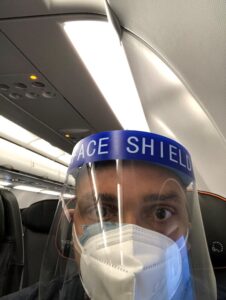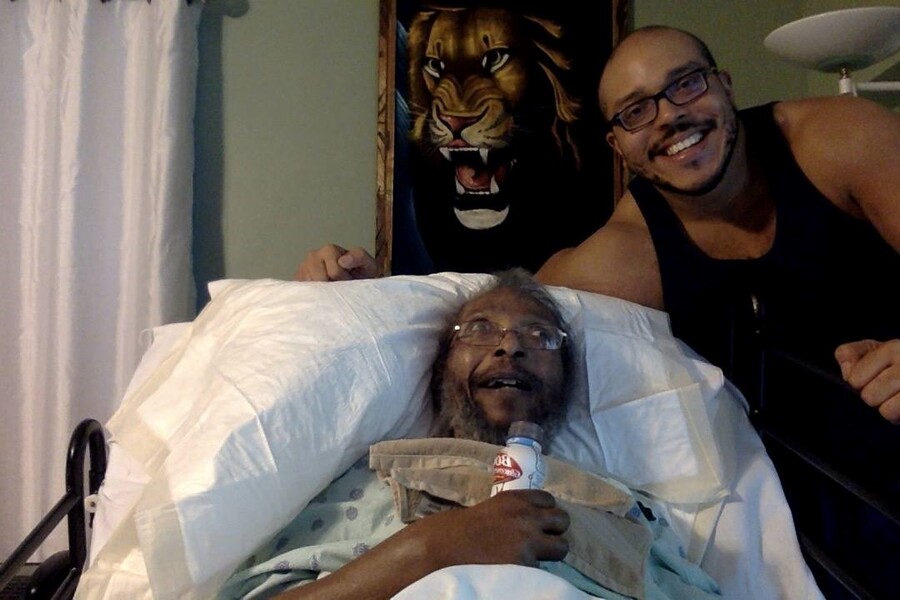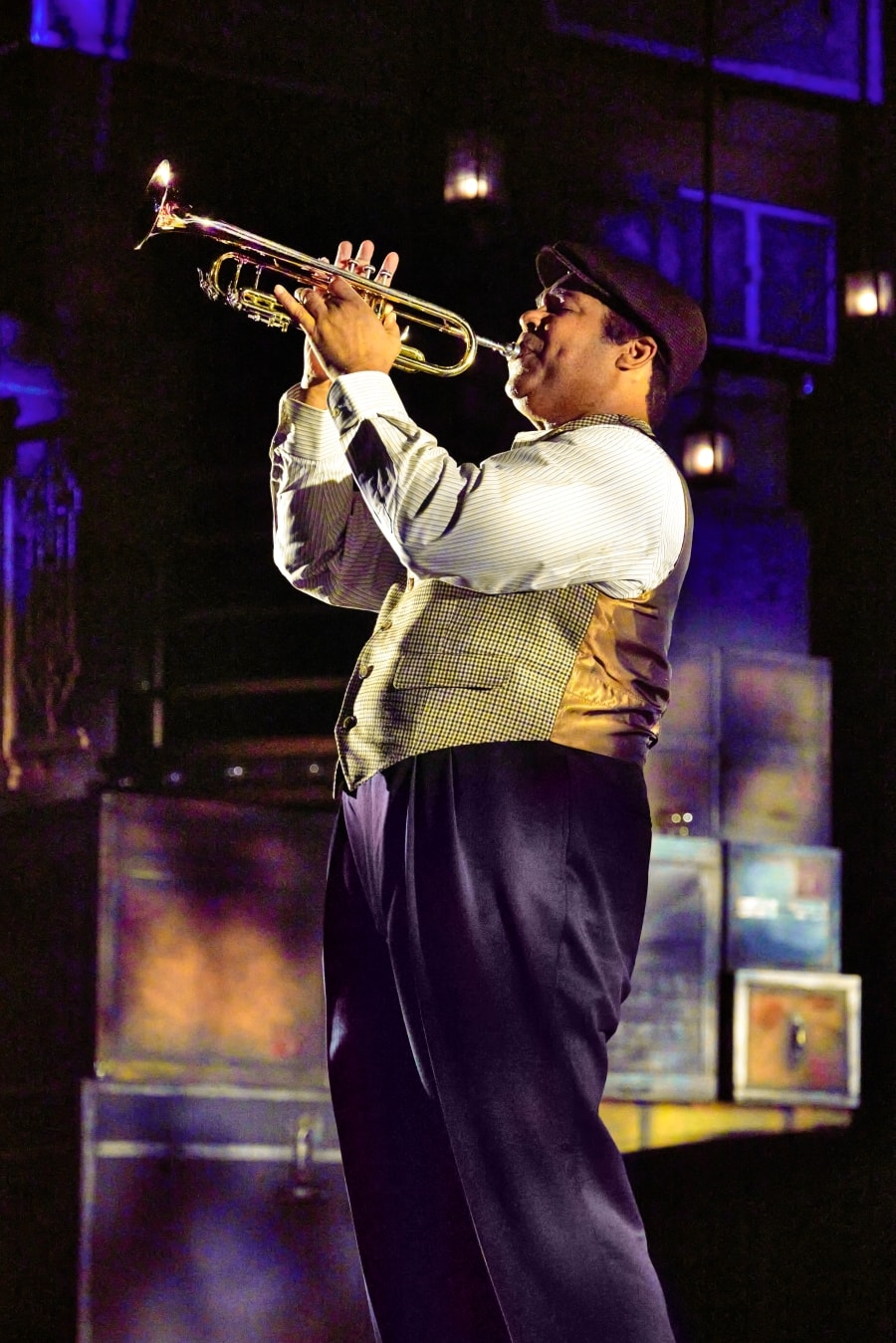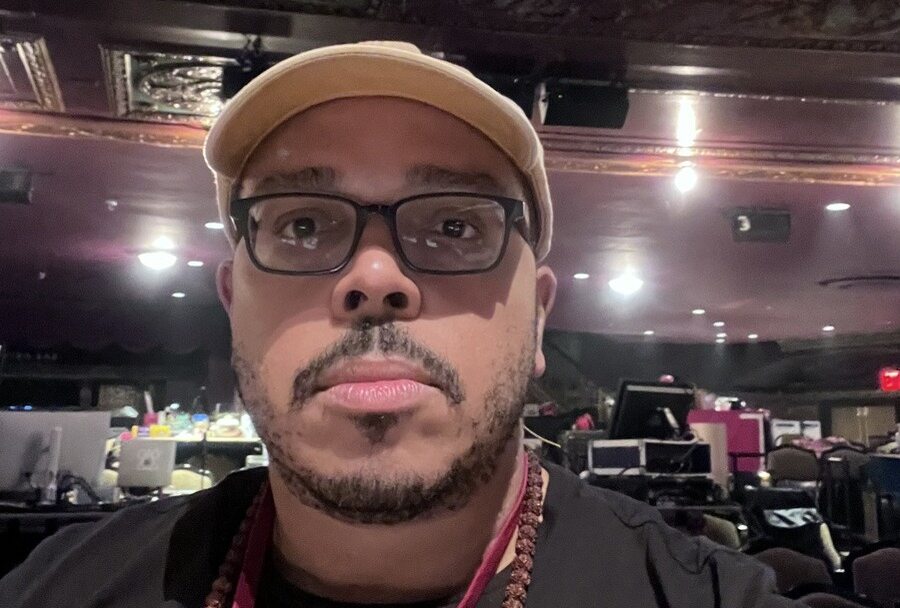I’m writing this on the morning of Aug. 19, 2024. It’s the official start of Broadway rehearsals for A Wonderful World: The Louis Armstrong Story, a new musical for which I wrote the book. It seems like a good time to reflect on the journey that brought me here. This show had many starts and stops throughout the era of theatre quarantine, reopening, cancellations, and as such offers a case study in the way work has been developed in the midst of these challenges.
I’ll start with an infamous day in American theatre history. On March 12, 2020, I took an Uber to Newark Airport. I was flying down to Miami for the second week of A Wonderful World previews.
Up to this point the process had been relatively quick: I had met up with director Christopher Renshaw and co-creator Andrew Delaplaine at Smith & Wollensky’s on South Beach the previous year, and we had hammered out a basic overarching structure. Then I holed up in a hotel room for three weeks in the spring of 2019 cranking out a 30-page outline with songs as well as a first draft. Miami New Drama announced it for their 2019-20 season, and we began holding a series of workshops and readings in Miami and New York, culminating in millions of dollars spent, designers and crew hired, auditions and rehearsals held. It had all been planned out so well.
As I stepped outside into the hot Miami afternoon and waited for my Uber, I got an email from the Miami New Drama saying that that night’s preview performance would be the show’s last. They were shutting down, and planned on reopening when this Covid wave passed in a month—maybe two months at the most. This was the new plan. And God laughed.
Remember when we were told that live theatre would start up again some time in the summer of 2020? In the meantime, I decided to have a reading retreat; I went to the local bookstore and grabbed some Haruki Murakami novels and a bunch of non-fiction books. It can be odd, what we choose to do during a crisis. I had decided that if I was going to perish in a plague, it was going to be with a book in hand. I deleted social media from my phone and I went to the beach. The soundtrack to these all-day excursions was Louis Armstrong.
After a week, I was thoroughly tanned, totally oblivious to the stream of online panic, and finished with three Murakami novels when there came another theatre shift: The coronavirus pause would last until the fall of 2020, possibly longer. The severity of the crisis was starting to sink in. The government shut down the beaches, so I went back to my hotel room. Then the hotel announced they were closing, so I could either hop on a plane back to New York City, or stay in Miami with my parents.
“Hey, Mom and Dad, you’ll never believe what’s happening. I’m in an Uber heading your way.”
Too Many Notes
At the start of the quarantine, I had a few finished plays ready for production. In addition to A Wonderful World, there was Mitchellville, a historical drama named for the first town of Black freedmen in America, which had been set for production in late 2020 at Lean Ensemble in South Carolina. Miami New Drama commissioned me to write a play about the O.J. trial that was on track for production the following season. There were two other commissions in the chamber. But all of that was blown up.
Fortunately, I had TV work. At the start of 2020 I was a producer-writer on both The Good Fight and Evil. I signed a three-year development deal with CBS. I didn’t know how much this would carry me through the next three-and-a-half years as my theatre career hung in limbo.
The AWW creative team decided to have a Zoom with Miami New Drama. Even though we had only had a week of previews before closing, we tried to get a sense of where we were at and what we could make better? A few producers who came to our previews said they saw “Broadway potential.” I wasn’t thinking about that in the middle of a plague and shutdown; I was focused on when we could get our show back up in Miami.
The initial Zoom meeting led to a few notes calls. I doodled with the script, but it was hard to get a sense of the finer nuances of rewrites over video conferencing. The theatre asked if I wanted a Zoom reading of the new pages, which didn’t excite me; we already had a polished draft and had seen it staged. The only thing worse than a reading on Zoom would be getting notes for nine different departments and creatives —in gallery view, no less. In my rewriting nightmares I saw a Hollywood Squares game show death panel of me standing before nine different boxes, all with voices talking simultaneously about how to fix my script.

In our intermittent meetings, I took notes and tried to figure out if they made sense with the characters’ wants and with the story we were telling. Then I would define the kind of rewriting strategy this would involve, while continuing to listen to Armstrong’s songs and his interviews.
Before we started this process, the director, Chris Renshaw, told me not to take the development and production process personally. Having worked on a few jukebox or catalog musicals, he told me, “If there’s anything beautiful, they’ll say it’s because of the music, singing, dance, acting, even the set. If there’s anything wrong, they’ll blame the book.”
In seeking to depersonalize the process, then, I sought out ways to classify both the notes I got and the spontaneous ideas I would get at random times. My intake box was divided into three categories: character wants, plot points, and tonal notes. Technically, all three parts should influence each other: A highly motivated character drives the plot, and their emotional state determines the tone of the music, the jokes, the world. Yet sometimes our mind leads with one or the other.
I sorted my outbox—i.e., how I addressed these various notes and thoughts—into three categories: search and destroy, contained, and tonal passes. “Search and destroy” is when I’m rooting out something specific that is sprinkled throughout a script and needs to go. “Contained” is when I focus on a scene or a sequence of scenes and rework them based on revised character motivations, emotions, or plot. And then there are the “tonal passes,” where I’ll go through an entire script to add a particular color or flavor. For instance, around the same time, I was writing a screenplay set in 1950s Alabama; before turning in my final draft, I did a final “Southern tonal pass,” adding in phrases, jokes, and images based upon research that specified the story.
Death and Previews
During the first year of the pandemic, I kept to myself. I saw people lose their minds, commit suicide from the isolation, move back home and go MAGA, quit their dreams to become realtors, and simply succumb to death. There has never been a time I was more familiar with death’s hands touching friends, family, Covid deniers, preachers, politicians who said they were washed in the blood of Jesus and didn’t need to wear a mask, or church choirs who decided that singing was the best cure. Death struck them down without any concern for class, race, political beliefs, religious fervor, or how good of a father or mother they were. It was the great equalizer.
My dad had been in home hospice care for several years. Bed-bound and mostly immobile, he was frail and susceptible to any infection. I stayed inside most of the time so I didn’t accidentally bring the virus home. I worked out on the patio, only went out to refill his medical supplies, and always wore a mask.
Writing was one of my few escapes. It was an old friend who was never going to get sick, become frail, die, or ghost me. I could conjure the cities within A Wonderful World, laugh at the characters, tweak a line, and relive moments from Louis Armstrong’s life.
My dad finally succumbed to his long-term illness a few days before the 2021 inauguration. He died peacefully at home in his bed, surrounded by my mom and me. He was Covid-negative. We had kept the virus away from him, but death still came.

Amid the mourning and mayhem, there was a glimmer of hope: a Covid vaccine. The theatre community perked up. If the creation and distribution of a vaccine was possible within the first six months of 2021, maybe life could go back to normal; maybe theatre could return in the summer of 2021 with a full slate. All we had to do was vaccinate everyone and get people to follow the rules! We all know how Americans love to follow government rules.
Unsurprisingly, the Covid vaccine was not universally taken, which slowed down the recovery. Broadway pushed its start to the fall. Regional theatre was more chaotic. There was no set pattern; it was figure-it-out-yourself. The AWW set was collecting dust on the Miami New Drama stage for over 18 months, too heavy and expensive to move—so they decided that A Wonderful World would be their first show after reopening.
For the opening in December 2021, there would be a Covid officer, regular tests, and expected cancellations in a new era of “managing the plague.” Death was still everywhere, but lessened and reduced. The ramp-up to production was filled with fear: How many actors would get it? Would they be safe? How many are vaccinated? Can we ask them? We were staging a massive, big-cast musical in Florida, a hotbed of Covid denialism and anti-vaxxers. Thanks to infections among the cast, we lost a week of shows in our December 2021-January 2022 run.
Even so, it was a hit. People surged back to the theatre by the end of the run. A few out-of-town producers, Carl White and Greg Rae from Martian Entertainment, came to Miami and expressed interest in the show’s next steps. After a few meetings, they decided that more out-of-town tryouts offered the best route to Broadway.
There was a big two-week “wives’ workshop” in New York City. A Wonderful World takes place in four different chapters, in four cities, with four separate wives of Louis Armstrong. Each wife is as distinctive as the cities and periods they represent: early 20th-century New Orleans, bootlegger Chicago, Great Depression Hollywood, and post-World War II New York City. In extensive sessions, we sculpted the worlds and the wives’ voices. We ran our thoughts by historians and consulted some jazz legends. We were ready to take the show on the road in the fall. God laughed—then nodded a bit.
Around this time, Andrew Delaplaine, one of the show’s original co-creators, died after a long illness. I had tried to meet up with Andrew a few times that year, but he wasn’t feeling well. Every time we’d planned a meeting, he would cancel and say, “Next time—next time you’re in town.” There was no next time.
On the evening of May 2, I wrote a note of condolence to Andrew’s family. This was the same day the WGA strike started, and all my TV work came to a screeching halt. It would be the longest labor stoppage in Hollywood history. TV work had sustained me during a long fallow period of 2020. Now the theatre would be my focus.
Salt and Subtlety
The first thing I did at the start of out-of-town rehearsals was get Covid. After managing to escape the virus for more than three years, it was now my turn. So I spent the first week of rehearsal isolated in my bedroom and Zooming in for certain parts. This turned out to be an unusually productive week. Freed from the pressure of socializing, I finished an extensive rewrite of AWW. I also finally finished my long-lingering O.J. trial play—now totally unproducible in a theatre market that favors small-cast shows and jukebox musicals. Oh, the irony!
Magically, the producers arranged it so that AWW would follow the first two chapters in Armstrong’s story: a start in New Orleans and a move to Chicago. After one rehearsal, the producers sat me down like they were staging an intervention. They had a big concern I had been unaware of: There’s a lot of cursing in this musical, as well as dirty jokes and the use of the “n” word. I had been so immersed in the jazz world that I wasn’t even thinking about how out-of-town audiences would respond to an R-rated musical.
Before I start any period piece, I make a tone board after researching music, poems, and the lingo of the era. Then I start cobbling together phrases, jokes, feelings. After listening to the private tapes of Louis Armstrong and other jazz musicians I heard—no surprise—a lot of salty talk. The musical’s tone reflects that era and its people. There was the risk that the regional theatre crowd would go in expecting to see Louis Armstrong as a bit of a smiling cartoon—a stereotype the musical was expressly designed to counter. Still, some audiences don’t like to have their heroes undercut or revealed in their truer colors.

So, for the sake of older, whiter, more genteel audiences, could I cut the curse words? Sure. I knew I could be more creative than that. I did an “un-tonal” pass, stripping away some of the paint and upholstery. A few things happened as a result: Removing some of these colors allowed me to look at the hard, cold structure of the scenes, minus the bells and whistles. Then I could reconstruct the scenes in simple and lean language, and add colors back in…but in a different way.
I thought back to the writers during the Hays Code era in Hollywood, which was in place for much of the 1930s to the 1960s, and which forbade open depiction of homosexuality, drug use, or anything deemed unsavory. These themes and plots didn’t disappear during these decades, though. In fact, the Hays Code forced writers and directors to be much more creative in finding ways to sneak the Jazz age and sexual liberation into their work. Some classic movies became more layered due to these restrictions.
I found that in removing the curse words, something happened to AWW: The dialogue got more creative and colorful. I discovered that you can be filthy with clean words. The poetry was in the suggestive double entendres, subtext, puns, pauses, a raised eyebrow.
The out-of-town runs in New Orleans and Chicago went by in a blur. Then the WGA strike ended, and I was back to juggling TV assignments and theatre. At the start of 2024, we took the notes from reviewers, audience members, producers, and creatives, and funneled and honed the notes into a roadmap to Broadway. It was important to maintain the integrity of the piece while revising what wasn’t yet clear. I wanted to include a dramaturg during this period and was fortunate that Faye Price, from Pillsbury House Theatre, came on board.
By the time we had our summer 2024 reading, we had been through a few different outlines and drafts of a Broadway-bound A Wonderful World. As our first reading for the larger team of designers, casting directors, producers began, there was tension in the air: Would all these notes amount to anything cohesive and understandable to people hearing this for the first time? On that afternoon, the months of post-tour notes created a piece of music, movement, and words that cast a magic spell in the room.
Whew. Perhaps we were in the clear?
Just kidding. Of course it’s not that simple. Even with a solid story, there’s so much more to be done. There are a million decisions among hundreds of different people still to be made. The book has continued to be refined.
Anything and everything can happen. I have learned to be prepared for all the twists and turns as we continue creating this wonderful world.
Aurin Squire is a playwright, reporter, and screenwriter from South Florida. His playwriting credits include Obama-ology, Don’t Smoke in Bed, 7 Deadly Sins, and Confessions of a Cocaine Cowboy. In TV, Squire was the co-executive producer and writer on The Good Fight and Evil. He is a New Dramatists resident playwright, a member of the Dramatists Guild of America, and the Writers Guild of America. He graduated from the Juilliard School and Northwestern University.


